The ASLE subvention and translation grant committee has announced the five ASLE member projects that have been awarded grants for 2022. We would like to thank the committee members who completed this challenging process of reviewing 30 abstracts: Heather Sullivan (chair), David Taylor, Hannes Bergthaler, and Lennie Amores. Please read more about their innovative projects below.
Subvention Grants
Alison Maas, “Left of the Coast”
The real and imagined disappearance of coastal terrains and ecosystems in California has given rise to new anxieties and polities that approach the state’s coast as a critical line in a “grim” struggle against the effects of anthropogenic climate change. A foreboding imagination of a vanishing coast suggests a narrative crisis in which the future becomes a space of retreat. Our graduate student working group “Coast as Crisis: A Humanities-led Multi-Campus Graduate Working Group on Narratives, Ecologies, and Politics of the California Coast” funded by the UCHRI (University of California Humanities Research Institute) is creating a digital map to counter this narrative and provide new approaches for communicating coastal crisis. Titled “Left of the Coast,” this web-based mapping project re-works the narrative of “retreat” from coastal crises and futures in terms of unsettled/unsettling histories, phenomena, and ecological crises that have been unfolding along the California coast for centuries. These crises are all enmeshed in economic, political, and cultural forces and may be materially traced through the militarization and sub/urbanization of California’s coastline, and through settler-colonial enforced retreat of Indigenous peoples from their coastal lands. Our work as a humanities-led group will underscore the unique capacities of humanities scholarship to interpret, synthesize, and narrativize environmental data through political and economic histories. Identifying and interpreting these manifold crises, and layering these insights into an interactive map, we question what it means to “live in” and with what is “left” of California’s coast. (240 words)
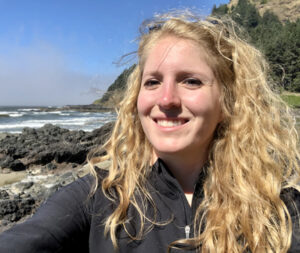 Alison Maas is a PhD. Candidate in English with a Designated Emphasis in Critical Theory at the University of California, Davis. Her work has appeared in Atlantic Studies and Comparative American Studies. She is creator of the podcast series “California’s Eroding Coastline” and co-editor of the Searchable Sea Literature website. Her current research focuses on early twentieth-century transatlantic literature, global shipping infrastructure, and the ecological crisis of coastal erosion. (69 words)
Alison Maas is a PhD. Candidate in English with a Designated Emphasis in Critical Theory at the University of California, Davis. Her work has appeared in Atlantic Studies and Comparative American Studies. She is creator of the podcast series “California’s Eroding Coastline” and co-editor of the Searchable Sea Literature website. Her current research focuses on early twentieth-century transatlantic literature, global shipping infrastructure, and the ecological crisis of coastal erosion. (69 words)
Roddy Scheer, launching a Spanish-language EarthTalk
EarthTalk is a non-profit media network that leverages the media to help educate individuals about how to live greener and take action to become better stewards for the planet. Our flagship project is the EarthTalk Q&A column, a weekly environmental “question-and-answer” that is syndicated to more than 600 media outlets across North America, reaching tens of millions of readers via the media outlets they already trust every week.
The goal of EarthTalk has always been to “preach beyond the choir” in terms of getting environmental information out to those who might not otherwise seek it. The bulk of our syndication partners are small-town weekly newspapers, which sign on for the free, high-quality content on environment and sustainability that they can use at will to help their readers stay abreast on the issues. We believe EarthTalk has been instrumental in helping convince the majority of Americans that we can protect the environment without hurting the economy and that carbon emissions need to be reined in if we want to prevent cataclysmic climate change. Our mission is to leverage the media to help educate individuals about how to live greener and take action to become better stewards for the planet.
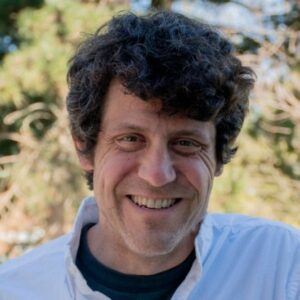 We are launching a Spanish-language version of our weekly environmental Q&A column EarthTalk. We hope to reach a wider and more diverse audience — and expand our impact in underserved communities throughout the western hemisphere.
We are launching a Spanish-language version of our weekly environmental Q&A column EarthTalk. We hope to reach a wider and more diverse audience — and expand our impact in underserved communities throughout the western hemisphere.
Roddy Scheer is the founder and executive director of EarthTalk, a 501(c)3 nonprofit that leverages the power of the media to help everyday people understand complex environmental issues and become more responsible consumers and better stewards for the planet.
Allie Wist and Lisa Schonberg, Sensory Kinship for the Third Kind
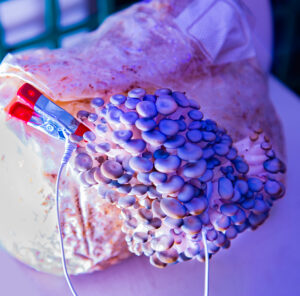 Sensory Kinship for the Third Kind is an artistic research project that engages in creative production through multi-sensory engagement with mushrooms. Our project enables a deeper understanding of cryptic communication by mushrooms and fungal mycelium. Fungal bodies represent a ‘third kind’ in their occupation of liminal spaces between life and death, hovering between our world and the underworld of subsoil. They deal directly with death and decay, and enrich soils. Although they are essential to the function of ecosystems, most fungal labor and energy is hidden temporally, spatially, and ecologically from human sensing. We are interested in what kind of interspecific relations can be forged through encounters that are primarily sensory and embodied. Our artistic work explores the potential for sensing mushrooms’ ‘third kind’ liminality as a productive and vibrant form of ontological instability. From this ‘in-betweenness,’ we can learn much about the complexities of ecological entanglements.
Sensory Kinship for the Third Kind is an artistic research project that engages in creative production through multi-sensory engagement with mushrooms. Our project enables a deeper understanding of cryptic communication by mushrooms and fungal mycelium. Fungal bodies represent a ‘third kind’ in their occupation of liminal spaces between life and death, hovering between our world and the underworld of subsoil. They deal directly with death and decay, and enrich soils. Although they are essential to the function of ecosystems, most fungal labor and energy is hidden temporally, spatially, and ecologically from human sensing. We are interested in what kind of interspecific relations can be forged through encounters that are primarily sensory and embodied. Our artistic work explores the potential for sensing mushrooms’ ‘third kind’ liminality as a productive and vibrant form of ontological instability. From this ‘in-betweenness,’ we can learn much about the complexities of ecological entanglements.
Our project will feature sounds that interact with mushroom bodies on three spatial and temporal levels. First, the ‘five tones’ [D-E-C-C-G] used in conversation with extraterrestrials in the film Close Encounters of the Third Kind will be projected through mushroom bodies, and the vibrations will then be picked up through a contact mic and amplified. Second, electrodes placed on the fruiting mushroom bodies will convert differences in electrical energy within the mushrooms to MIDI data, which is then also amplified. A third, temporally removed layer of sonic interaction will amplify sounds recorded from electrical energy of mushrooms growing in our local forest. These field recordings will be projected through the fruiting bodies in the installation in real time. The three sonic components of the installation will be spatialized so that the sonic perspective shifts as visitors move through the work. We would host workshops with both adults and youths where they can learn to ‘hear’ the mushroom bodies through the use of Midi sensors, and workshop on how to ‘compose’ fungal music with Schonberg.
In addition to audio, smell will comprise another unexpected form of sensory engagement with the mushrooms. Diffusers or perfume vials in the installation would allow visitors to smell dried mushrooms grown by Wist, and for the workshop component, visitors would be led through a mushroom smelling exercise and story sharing. Smell is an intimate and corporeal method for engaging non-human bodies; smell lingers in the same way that fungal and ecological entanglements do, and the potent smell of the mushrooms in Sensory Kinship of the Third Kind ask viewers to participate in a kind of invasive aesthetics to relate to the mushroom’s materiality.
Texts interspersed in the exhibition feature a final form of co-authorship with mushrooms. MIDI data from mushroom field recordings were overlaid onto human-authored papers about extraterrestrial fungal research, creating collaborative “poems” compiled by Wist.
Our work uses the senses to embrace the uncanny ‘third kind’ liminality of mushrooms to create a type of ‘being-with’ otherwise unseen sensory fungal worlds.
Allie E.S. Wist is a scholar-artist currently working on an Arts PhD from Rensselaer Polytechnic Institute with a focus on sensory futures and the Anthropocene. Her work encompasses photography, radio, artifacts, installations, and writing that render multi-temporalities accessible through material and speculative narratives. She has an MA in Food Studies from NYU, and she has taught at both NYU and The New School. Her artwork has been exhibited with Honolulu Biennial, The Wellcome Collection, and HESSE FLATOW.
Lisa Schonberg is a composer, percussionist, sound artist and writer. Informed by her background in entomology, her work challenges assumptions about insects and other beings that humans reject or fear. Recent work includes investigations of ant bioacoustics in the Brazilian Amazon, forest ecology, endangered Hawaiian bees, mushrooms, and plastics.
Translation Grants
Alenda Y. Chang, translating “States of Media+Environment” articles into Mandarin Chinese
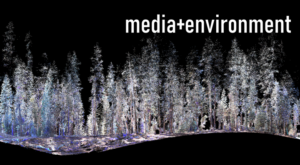 Launched in 2019, Media+Environment (https://mediaenviron.org/) is an open access, online, peer-reviewed journal of transnational and interdisciplinary ecomedia research. The journal seeks to foster dialogue within a fast-growing global community of researchers and creators working to understand and address the myriad ways that media and environments affect, inhabit, and constitute one another. The journal encourages both traditional and multimodal forms of scholarship and cultivates a broad audience of not only humanities scholars, but also artists, activists, scientists, social scientists, and the general public. Recent issues, or “streams,” have included Modeling the Pacific Ocean, Disaster Media, and Mediating Art and Science, and new streams on masculinity and nature, and energy justice in global perspective, will be available soon.
Launched in 2019, Media+Environment (https://mediaenviron.org/) is an open access, online, peer-reviewed journal of transnational and interdisciplinary ecomedia research. The journal seeks to foster dialogue within a fast-growing global community of researchers and creators working to understand and address the myriad ways that media and environments affect, inhabit, and constitute one another. The journal encourages both traditional and multimodal forms of scholarship and cultivates a broad audience of not only humanities scholars, but also artists, activists, scientists, social scientists, and the general public. Recent issues, or “streams,” have included Modeling the Pacific Ocean, Disaster Media, and Mediating Art and Science, and new streams on masculinity and nature, and energy justice in global perspective, will be available soon.
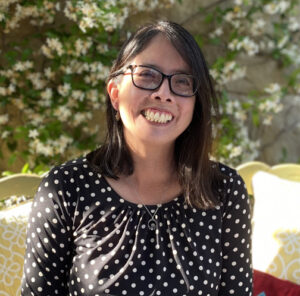 ASLE’s grant will support the translation of groundbreaking, already published articles from our inaugural issue, “States of Media+Environment,” into Mandarin Chinese, including two essays on elemental media studies by Nicole Starosielski and Yuriko Furuhata, and Laura U. Marks’s call to consider the carbon footprint of video on-demand streaming.
ASLE’s grant will support the translation of groundbreaking, already published articles from our inaugural issue, “States of Media+Environment,” into Mandarin Chinese, including two essays on elemental media studies by Nicole Starosielski and Yuriko Furuhata, and Laura U. Marks’s call to consider the carbon footprint of video on-demand streaming.
Alenda Y. Chang is an Associate Professor of Film and Media Studies at the University of California, Santa Barbara. Her book, Playing Nature: Ecology in Video Games, develops environmentally informed frameworks for understanding and designing digital games. She is also a founding co-editor of the UC Press open-access journal, Media+Environment.
P. Rajitha Venugopal, PachaViral: Dayabaiyude Aatmakatha (Green Finger: The Life Story of Dayabai)
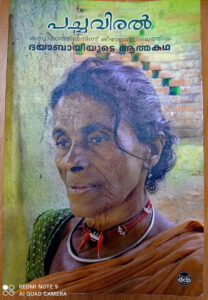 The project involves the translation of a biography titled Pachaviral: Dayabaiyude Aatmakatha from Malayalam to English. Dayabai aka Mercy Mathew is an activist working for the indigenous communities in the tribal belt of Madhya Pradesh in Central India. She belongs to a Catholic family based in Kottayam, Kerala in southern India. She was ordained to be a nun. But she realized her calling for working for poor people and left the convent to the rural grassroots. The book titled Pachaviral (Green Finger): Dayabaiyude Aatmakatha is the biography of Dayabai written/compiled by Issac Wilson, a police officer in the Kerala State Police Department. The book was published by DC Books in 2009. The book is relevant in this time because: It is about the life and sacrifices of a woman who has worked for the betterment of the Gond tribes of Madhya Pradesh and helped them fight for their rights. She has worked with them to provide them education, and help them in resisting the exploitation by feudalists, bureaucrats and capitalists. It is relevant to read literature written about this issue to add to the body of works that talk about struggles of resistance and survival by people from marginalized sections of the society.
The project involves the translation of a biography titled Pachaviral: Dayabaiyude Aatmakatha from Malayalam to English. Dayabai aka Mercy Mathew is an activist working for the indigenous communities in the tribal belt of Madhya Pradesh in Central India. She belongs to a Catholic family based in Kottayam, Kerala in southern India. She was ordained to be a nun. But she realized her calling for working for poor people and left the convent to the rural grassroots. The book titled Pachaviral (Green Finger): Dayabaiyude Aatmakatha is the biography of Dayabai written/compiled by Issac Wilson, a police officer in the Kerala State Police Department. The book was published by DC Books in 2009. The book is relevant in this time because: It is about the life and sacrifices of a woman who has worked for the betterment of the Gond tribes of Madhya Pradesh and helped them fight for their rights. She has worked with them to provide them education, and help them in resisting the exploitation by feudalists, bureaucrats and capitalists. It is relevant to read literature written about this issue to add to the body of works that talk about struggles of resistance and survival by people from marginalized sections of the society.
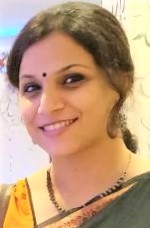 Dr. P. Rajitha Venugopal teaches as Assistant Professor in the Department of Humanities and Languages, FLAME University, Pune, India. She holds a Ph.D degree in English Literature from Jamia Millia Islamia, New Delhi. Her dissertation was a critical analysis of the works of Barbara Kingsolver. She has presented research papers at several national and international conferences and has contributed to journals and edited volumes. Prior to this, she has contributed two chapters to edited volume of translated essays from Malayalam to English for an ASLE sponsored project.
Dr. P. Rajitha Venugopal teaches as Assistant Professor in the Department of Humanities and Languages, FLAME University, Pune, India. She holds a Ph.D degree in English Literature from Jamia Millia Islamia, New Delhi. Her dissertation was a critical analysis of the works of Barbara Kingsolver. She has presented research papers at several national and international conferences and has contributed to journals and edited volumes. Prior to this, she has contributed two chapters to edited volume of translated essays from Malayalam to English for an ASLE sponsored project.
